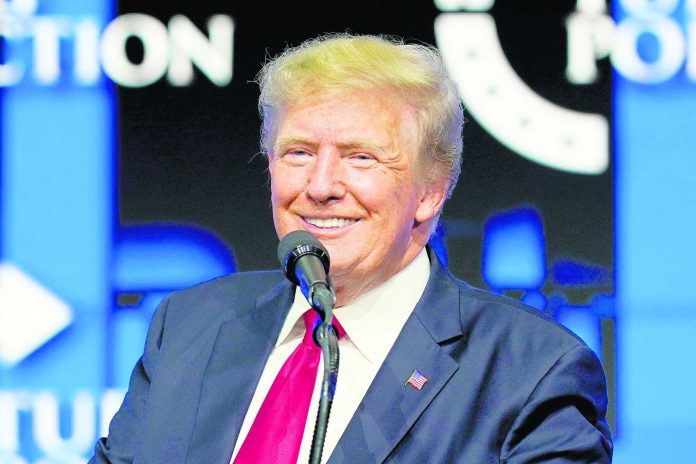
By STAN CHOE and BERNARD CONDON
Associated Press
NEW YORK (AP) — Regulators are looking into the deal that would bring Donald Trump’s new social media company to the stock market, one that has attracted both legions of fans of the former president and people looking to make a quick profit.
The company partnering with Trump Media & Technology Group acknowledged the inquiries in a filing it made with regulators on Monday. It also gave some financial forecasts for the company, which is hoping to rival Twitter and other platforms that banned Trump, along with Netflix and other streaming video services. It said over the weekend that it’s lined up $1 billion in promised investments from a group of unnamed institutional investors.
The regulatory questions focus on the October announcement by Trump’s media venture that it would merge with Digital World Acquisition Corp. That company had launched on the U.S. stock market three weeks earlier with the sole purpose of finding a privately held company to buy. It’s often referred to by its trading symbol of “DWAC.”
DWAC said Monday that it is cooperating with “the preliminary, fact-finding inquiries” by the the Securities and Exchange Commission and the Financial Industry Regulatory Authority.
The SEC early last month requested documents related to meetings of DWAC’s board, trading policies and communications between DWAC and Trump’s media venture, among other things. According to DWAC, the SEC’s request said the commission’s “investigation does not mean that the SEC has concluded that anyone violated the law or that the SEC has a negative opinion of DWAC or any person, event, or security.”
The SEC could be looking at whether DWAC and Trump’s company had any conversations about a deal before DWAC’s own initial public offering of stock, said Jay Ritter, a professor at the University of Florida who is an expert on IPOs. DWAC is sitting on about $293 million in cash raised through its IPO.
Under rules for these blank-check companies, known as special-purpose acquisition companies, or SPACs, they’re not supposed to line up acquisition targets before selling their own shares. Senator Elizabeth Warren on Nov. 17 wrote a letter to the SEC’s chair, Gary Gensler, asking if the agency is exploring whether DWAC had violated the law by holding such discussions and misleading potential investors by failing to let them know about it before its IPO.
Asked how worried he would be about the SEC’s investigation if he were on the receiving end, Ritter said, “It depends on what I knew. This could be innocuous or pro-forma stuff, or it could be really serious.”
It’s not clear whether the issues that Warren raised were behind the regulatory request for documents. DWAC and Trump Media did not respond immediately to requests for comment on Monday.
An SEC spokesperson declined to comment beyond saying, “The SEC does not comment on the existence or nonexistence of a possible investigation.”
Seapartely, the Financial Industry Regulatory Authority, or FINRA, asked in late October and early November for a review of trading in DWAC’s stock before the Oct. 20 merger deal was announced. That could be an indication of a search for insider trading, Ritter said, though it’s a notoriously difficult thing to prove.
The merger announcement sent DWAC’s stock surging from $9.96 to $94.20 in just two days as Trump supporters and investors looking to make a fast buck piled in. The shares have since pulled back to roughly $43.
Such a lofty price indicates high expectations for Trump’s media venture among at least some investors. In its filing with regulators, DWAC also gave some financial forecasts for the company, which has yet to launch.
The presentation included forecasts that the company’s Truth Social service may have 81 million users by 2026, or nearly 7 million more people than voted for Trump in the last U.S. presidential election.
In five years, Trump Media is forecast to generate nearly $3.7 billion in revenue, according to the filing. That is more than the annual revenue of retailer Restoration Hardware, RV maker Winnebago Industries and entertainment giant iHeart Media, which owns more than 800 radio stations.
SPACs generally are known for giving very optimistic forecasts about their future growth in presentations to investors.
DWAC was shaky in Monday trading following the filing. It opened with a slight gain before falling to a 3.2% loss.



















